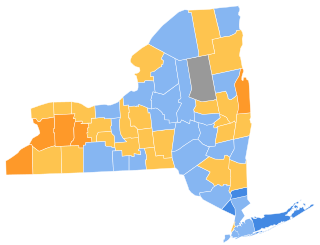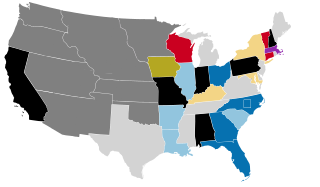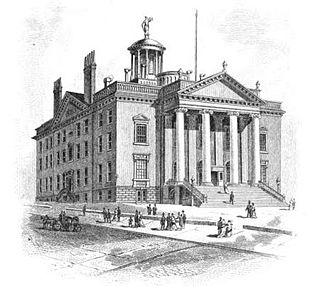
William Henry Seward was an American politician who served as United States Secretary of State from 1861 to 1869, and earlier served as governor of New York and as a United States senator. A determined opponent of the spread of slavery in the years leading up to the American Civil War, he was a prominent figure in the Republican Party in its formative years, and was praised for his work on behalf of the Union as Secretary of State during the Civil War. He also negotiated the treaty for the United States to purchase the Alaska Territory.

The 1860 Republican National Convention was a presidential nominating convention that met May 16–18 in Chicago, Illinois. It was held to nominate the Republican Party's candidates for president and vice president in the 1860 election. The convention selected former representative Abraham Lincoln of Illinois for president and Senator Hannibal Hamlin of Maine for vice president.

The 1848 Whig National Convention was a presidential nominating convention held from June 7 to 9 in Philadelphia. It nominated the Whig Party's candidates for president and vice president in the 1848 election. The convention selected General Zachary Taylor of Louisiana for president and former Representative Millard Fillmore of New York for vice president.

The 1850 New York state election was held on Tuesday November 5, 1850, to elect the Governor, the Lieutenant Governor, a Canal Commissioner, an Inspector of State Prisons and the Clerk of the Court of Appeals, as well as all members of the New York State Assembly.

The 1854 New York state election was held on November 7, 1854, to elect the governor, the lieutenant governor, a Canal Commissioner and an Inspector of State Prisons, as well as all members of the New York State Assembly.

The 1832 New York gubernatorial election was held from November 5 to 7, 1832, to elect the Governor and Lieutenant Governor of New York.

The 1836 New York gubernatorial election was held from November 7 to 9, 1836, to elect the Governor and Lieutenant Governor of New York.

The 1838 New York gubernatorial election was held from November 5 to 7, 1838, to elect the Governor of New York.

The 1840 New York gubernatorial election was held from November 2 to 4, 1840, to elect the Governor and Lieutenant Governor of New York.

The 1839—1840 United States Senate election in New York was held on February 5, 1839 and January 14, 1840. Incumbent Senator Nathaniel P. Tallmadge was re-elected to a second term in office over scattered opposition.

The 1849 United States Senate election in New York was held on February 6, 1849, by the New York State Legislature to elect a U.S. Senator to represent the State of New York in the United States Senate.

The 1851 United States Senate election in New York was held on February 4 and March 18–19, 1851, by the New York State Legislature to elect a U.S. Senator to represent the State of New York in the United States Senate.

The 1855 United States Senate election in New York was held on February 6, 1855, by the New York State Legislature to elect a U.S. Senator to represent the State of New York in the United States Senate.

The 1850–51 United States Senate elections were held on various dates in various states. As these U.S. Senate elections were prior to the ratification of the Seventeenth Amendment in 1913, senators were chosen by state legislatures. Senators were elected over a wide range of time throughout 1850 and 1851, and a seat may have been filled months late or remained vacant due to legislative deadlock. In these elections, terms were up for the senators in Class 1.

The 1854–55 United States Senate elections were held on various dates in various states. As these U.S. Senate elections were prior to the ratification of the Seventeenth Amendment in 1913, senators were chosen by state legislatures. Senators were elected over a wide range of time throughout 1854 and 1855, and a seat may have been filled months late or remained vacant due to legislative deadlock. In these elections, terms were up for the senators in Class 3.

The 57th New York State Legislature, consisting of the New York State Senate and the New York State Assembly, met from January 7 to May 6, 1834, during the second year of William L. Marcy's governorship, in Albany.

The 58th New York State Legislature, consisting of the New York State Senate and the New York State Assembly, met from January 6 to May 11, 1835, during the third year of William L. Marcy's governorship, in Albany.

The 61st New York State Legislature, consisting of the New York State Senate and the New York State Assembly, met from January 2 to April 18, 1838, during the sixth year of William L. Marcy's governorship, in Albany.

The 62nd New York State Legislature, consisting of the New York State Senate and the New York State Assembly, met from January 1 to May 7, 1839, during the first year of William H. Seward's governorship, in Albany.

The 1850 New York gubernatorial election was held on November 7, 1850. Incumbent Governor Hamilton Fish was not a candidate for re-election. Washington Hunt was elected to succeed him, defeating Horatio Seymour in the latter's first run for governor. Seymour would go on to serve two terms in office and be nominated for President of the United States in 1868.
















